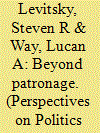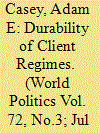|
|
|
Sort Order |
|
|
|
Items / Page
|
|
|
|
|
|
|
| Srl | Item |
| 1 |
ID:
116434


|
|
|
|
|
| Publication |
2012.
|
| Summary/Abstract |
We explore the sources of durability of party-based authoritarian regimes in the face of crisis. Recent scholarship on authoritarianism suggests that ruling parties enhance elite cohesion-and consequently, regime durability-by providing institutionalized access the spoils of power. We argue, by contrast, that while elite access to power and spoils may ensure elite cooperation during normal times, it often fails to do so during crises. Instead, the identities, norms, and organizational structures forged during periods of sustained, violent, and ideologically-driven conflict are a critical source of cohesion-and durability-in party-based authoritarian regimes. Origins in violent conflict raise the cost of defection and provide leaders with additional (non-material) resources that can be critical to maintaining unity and discipline, even when a crisis threatens the party's hold on power. Hence, where ruling parties combine mechanisms of patronage distribution with the strong identities, solidarity ties, and discipline generated by violent origins, regimes should be most durable.
We apply this argument to four party-based competitive authoritarian regimes in post-Cold War Africa: Kenya, Mozambique, Zambia, and Zimbabwe. In each of these cases, an established single- or dominant-party regime faced heightened international pressure, economic crisis, and a strong opposition challenge after 1990. Yet whereas ruling parties in Kenya and Zambia were organized almost exclusively around patronage, those in Mozambique and Zimbabwe were liberation parties that came to power via violent struggle. This difference is critical to explaining diverging post-Cold War regime outcomes: whereas ruling parties in Zambia and Kenya imploded and eventually lost power in these face of crises, those in Mozambique and Zimbabwe remained intact and regimes survived.
|
|
|
|
|
|
|
|
|
|
|
|
|
|
|
|
| 2 |
ID:
173637


|
|
|
|
|
| Summary/Abstract |
Conventional wisdom holds that great power patrons prop up client dictatorships. But this is generally assumed rather than systematically analyzed. This article provides the first comprehensive analysis of the relationship between foreign sponsorship and authoritarian regime survival, using an original data set of all autocratic client regimes in the postwar period. The results demonstrate that patronage from Western powers—the United States, France, and the United Kingdom—is not associated with client regime survival. Rather, it’s only Soviet sponsorship that reduced the risk of regime collapse. The author explains this variation by considering the effects of foreign sponsorship on the likelihood of military coups d’état. He argues that the Soviet Union directly aided its clients by imposing a series of highly effective coup prevention strategies. By contrast, the US and its allies didn’t provide such aid, leaving regimes vulnerable to military overthrow.
|
|
|
|
|
|
|
|
|
|
|
|
|
|
|
|
| 3 |
ID:
147311


|
|
|
|
|
| Summary/Abstract |
Studies on Chinese politics frequently utilize the safety valve analogy to describe various political decisions that allow space for feedback and challenges. Drawing upon these empirical studies and the theoretical literature on institution, authoritarianism, and democratization, this review essay delineates the logic of the safety valve strategy and how it fits into the scheme of prolonging authoritarian rule. It identifies the use of informal and temporary measures to appease aggrieved citizens as the central feature of the safety valve strategy, complementing formal means such as institutional reform. The informal and temporary measures are different from the patronage system, and credibility is not necessarily a prerequisite for effectiveness. The safety valve strategy contributes to authoritarian resilience by relieving public frustration, reducing the propensity to contentious politics, and in some cases enabling the government to collect information on potential opposition groups or emerging problems.
|
|
|
|
|
|
|
|
|
|
|
|
|
|
|
|
| 4 |
ID:
174766


|
|
|
|
|
| Summary/Abstract |
This article explores the causes of authoritarian durability. Why do some authoritarian regimes survive for decades, often despite severe crises, while others collapse quickly, even absent significant challenges? Based on an analysis of all authoritarian regimes between 1900 and 2015, the authors argue that regimes founded in violent social revolution are especially durable. Revolutionary regimes, such as those in Russia, China, Cuba, and Vietnam, endured for more than half a century in the face of strong external pressure, poor economic performance, and large-scale policy failures. The authors develop and test a theory that accounts for such durability using a novel data set of revolutionary regimes since 1900. The authors contend that autocracies that emerge out of violent social revolution tend to confront extraordinary military threats, which lead to the development of cohesive ruling parties and powerful and loyal security apparatuses, as well as to the destruction of alternative power centers. These characteristics account for revolutionary regimes’ unusual longevity.
|
|
|
|
|
|
|
|
|
|
|
|
|
|
|
|
|
|
|
|
|